过去分词作状语
过去分词作状语详解

过去分词作状语详解一.过去分词作状语的基本用法:过去分词作状语主要是说明谓语动作发生的背景或条件;表示原因、时间、条件、让步、方式或伴随情况等。
过去分词可置于主句前,也可置于主句后,用逗号与主句隔开。
例如:1. 原因状语Choked by the heavy smoke, he could hardly breathe. 他被浓烟呛了,几乎不能呼吸了。
Caught in a heavy rain, he was all wet. 因为淋了一场大雨,所以他全身湿透了。
Frightened by the noise in the night, the girl didn’t dare to sleep in her room. 受到夜晚响声的惊吓,那姑娘不敢睡在她的房间。
2. 时间状语Left to itself in the room, the baby began to cry.当被孤独地留在房间里时,婴儿哭了起来。
Asked why he did it, the monitor said it was his duty. 当被问及这件事时,班长说这是他的职责。
Approached in the dark, the lights looked lonely and purposeless. 在黑暗中走近时。
那些电灯显得孤单而无意义。
3. 条件状语Seen in this aspect, the matter isn’t as serious as people generally suppose.如果从这个角度看,问题并不像人们一般预料的那样`严重。
Grown in rich soil, these seeds can grow fast. 如果种在肥沃的土壤里,这些种子能长得很快。
Given better attention, the accident could have been avoided. 要是多加注意,那次事故就能避免了。
现在分词与过去分词作状语的区别

Having been criticized by the teacher, Li Ming gave up smoking. (完成式被动态)
After he had been criticized by the teacher, Li Ming gave up smoking.
练习坊
• 用所给词的适当形式填空,并与A-C的汉 语翻译相匹配。
Difference between the Present Participle and the Past Participle
(现在分词与过去分词的区别)
_U_s__e_dfor a long time, the book looks old.
由于用了很长时间,这本书看上去很旧. _U__s_in__gthe book, I find it useful. 在使用的过程中,我发现这本书很有用.
7. _f_o_l_l_o_w__e(dhear) the news, they all jumped wiHthejaoryi.ng
8. The teach buildingbs u__il_t__ (build) in 1960 need repairing.
9. I found my school balgef_t___ (leave) in Mary’s room.
定语
(1) 表用途 == “名词+for+V-ing”。
a a
swleaelkpininggsbtiacgk((==a
bag for slee表n动in作g –sh主o动es,(s=ah正so在teics进kf行ofor,rruw=na=nlki=ning定g语)从句
一个跳舞的女孩---
过去分词短语作状语与主句主语
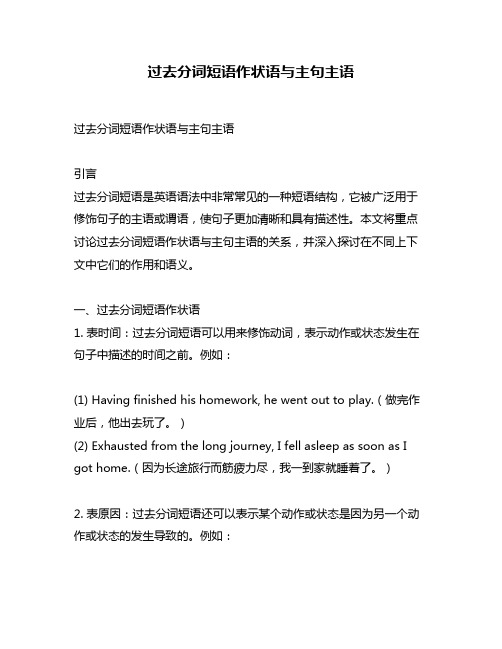
过去分词短语作状语与主句主语过去分词短语作状语与主句主语引言过去分词短语是英语语法中非常常见的一种短语结构,它被广泛用于修饰句子的主语或谓语,使句子更加清晰和具有描述性。
本文将重点讨论过去分词短语作状语与主句主语的关系,并深入探讨在不同上下文中它们的作用和语义。
一、过去分词短语作状语1. 表时间:过去分词短语可以用来修饰动词,表示动作或状态发生在句子中描述的时间之前。
例如:(1) Having finished his homework, he went out to play.(做完作业后,他出去玩了。
)(2) Exhausted from the long journey, I fell asleep as soon as I got home.(因为长途旅行而筋疲力尽,我一到家就睡着了。
)2. 表原因:过去分词短语还可以表示某个动作或状态是因为另一个动作或状态的发生导致的。
例如:(1) She missed the bus, being late for work.(她错过了公交车,因为迟到上班。
)(2) The team lost the match, having made too many mistakes.(由于犯了太多错误,队伍输掉了比赛。
)3. 表方式:过去分词短语可以描述动作的方式或方式。
例如:(1) He drove the car, carefully avoiding any obstacles.(他小心地开车,避开了任何障碍。
)(2) She completed the project, skillfully using her knowledge.(她运用自己的知识,熟练地完成了项目。
)二、过去分词短语作主句主语过去分词短语还可以作为主句的主语,这时它在句子中扮演的角色更加突出,通常表示被动或完成的动作。
1. 表示被动:过去分词短语作为主句主语时,通常表示主语所受到的动作或影响。
过去分词作状语的用法归纳

过去分词作状语的用法归纳
1. 哎呀,当过去分词表示被动或完成的时候,就可以作状语啦!就像“He was deeply moved by the story.”这里的“moved”就是被故事深深打动呀。
2. 嘿,要是过去分词用来表达原因,那也是很妙的哟!比如说“Frustrated by the failure, he almost gave up.”这“Frustrated”不就是因为失败而沮丧嘛。
3. 哇塞,当过去分词表示时间,这多神奇呀!像“Seen from the top of the mountain, the view is amazing.”看到没,“Seen”就是从山顶被看到那个时间点呀。
4. 哟呵,过去分词表示条件的时候,是不是很有意思呀!例如“If prepared well, you will do great.”这里的“prepared”就是如果准备好这个条件呀。
5. 哈哈,过去分词还能表示让步呢!像“Though beaten many times, he still doesn't give up.”“beaten”就是尽管被打击很多次啦。
6. 哎呀呀,当表示方式或伴随的时候,过去分词也能上呀!比如“She sat there, lost in thought.”“lost”不就是那种伴随的状态嘛。
7. 嘿呀嘿呀,过去分词作状语的时候,可真是变化多端呢!就像“Surrounded by his friends, he feels happy.”“Surrounded”就是周围被朋友围着呀。
8. 哇哦,过去分词这么有用,大家可得好好掌握呀!
总之,过去分词作状语的用法很多,大家要多多练习,才能运用自如呀!。
过去分词作状语

动词-ing或过去分词作状语, 其逻辑 主语应是主句主语。
2. If ___ the same treatment again, he’s sure to get well. A. giving B. give C. given D. being given
3. _____ in 1636, Harvard is one of the
A. followed C. to be followed
B. following D. being followed
3. The next morning she found the man _A__ in bed, dead.
A. lying C. lay
B. lie D. laying
4. I can hardly imagine Peter _B__ across the Atlantic Ocean in five days.
A. are bought B. bought C. been bought D. buying
( D)14. Don’t use words, expressions, or phrases ________ only to people with specific knowledge. A. being known B. having been known C. to be known D. known
高考链接
(A)1. _______ more attention, the tree
could have grown better.
A. Given B. To give
C. Giving D. Having given.
(D)2. The computer center, ________ last
过去分词短语作状语课件

注意积累
平时学习中要注意积累过去分词短语作状语的用法,建立 自己的语料库。
在学习过程中,遇到过去分词短语作状语的句子,可以摘 录下来,整理到自己的语料库中。这样不仅可以加深对这 种用法的理解,还可以在以后的写作中加以运用。
常见错误分析
总结词
纠正常见错误,提高语言准确性
详细描述
通过分析常见的错误用法,如"He is followed by his assistant.",可以指出过去分词 短语作状语常见的错误形式,帮助学习者避免类似的错误,提高语言使用的准确性。
05
如何提高过去分词短语作状语的运用能力
多读多写
通过大量的阅读和写作练习,可以提高对过去分词短语作状 语的理解和运用能力。
时间状语
总结词
表示动作发生的时间
详细描述
过去分词短语用作时间状语时,通常放在句首或句尾,用来描述某个动作发生 的时间点或时间段。例如,“Having finished his homework, he went to bed.”(完成作业后,他去睡觉了。)
Hale Waihona Puke 条件状 语总结词表示某个动作发生的条件
详细描述
简单例句分析
总结词
简单明了,易于理解
详细描述
通过简单的例句,如"He came in, followed by his assistant.",可以直观地展示过去分词短语作状语的结构和 用法。这种例句结构简单,容易理解,适合初学者学习。
过去分词作状语的用法

过去分词作状语(The Past Participle used as Adverbial) 一、过去分词作状语的一般用法1. 过去分词作状语,可以表示时间,原因,条件,让步及伴随情况等。
过去分词作状语,可以表示时间,原因,条件,让步及伴随情况等。
过去分词作状语,其逻辑主语必须和句子主语保持一致,并且必须是被动关系。
过去分词作状语,其逻辑主语必须和句子主语保持一致,并且必须是被动关系。
Asked how he broke into the room, he made no answer. (当有人问他怎么闯进屋里来,他一声不吭。
)_________________________________ When heated ,water will be turned into steam. 水加热后会变成蒸汽。
(表示时间)(表示时间) ___________________________________ Deeply moved by the film , we all cried. 由于被电影深深打动,我们都哭了。
(表示原因)___________________________________ Born into a poor family , he had no more than two years of schooling. 出生于贫苦家庭,他只上了两年学。
___________________________________ Given more help, we could have done the work better. 如果给我们的帮助多一些,我们本来能做的更好。
(条件)___________________________________ Though frightened by the big fire , he stood out bravely. 尽管害怕大火,可他还是勇敢地站了起来。
语法专题:过去分词作状语
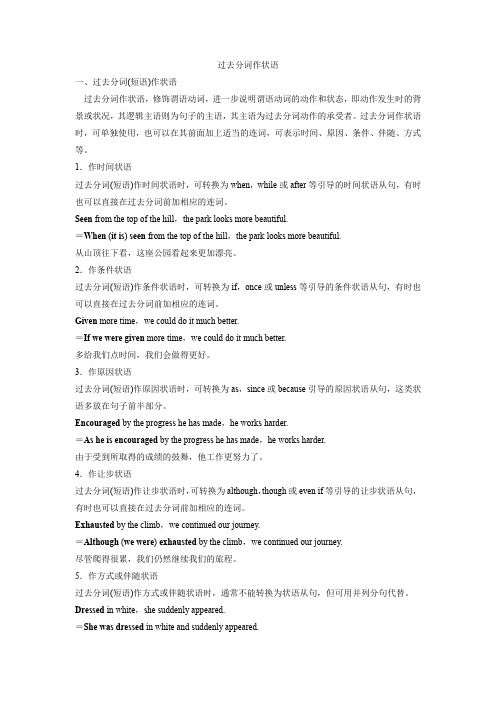
过去分词作状语一、过去分词(短语)作状语过去分词作状语,修饰谓语动词,进一步说明谓语动词的动作和状态,即动作发生时的背景或状况,其逻辑主语则为句子的主语,其主语为过去分词动作的承受者。
过去分词作状语时,可单独使用,也可以在其前面加上适当的连词,可表示时间、原因、条件、伴随、方式等。
1.作时间状语过去分词(短语)作时间状语时,可转换为when,while或after等引导的时间状语从句,有时也可以直接在过去分词前加相应的连词。
Seen from the top of the hill,the park looks more beautiful.=When (it is) seen from the top of the hill,the park looks more beautiful.从山顶往下看,这座公园看起来更加漂亮。
2.作条件状语过去分词(短语)作条件状语时,可转换为if,once或unless等引导的条件状语从句,有时也可以直接在过去分词前加相应的连词。
Given more time,we could do it much better.=If we were given more time,we could do it much better.多给我们点时间,我们会做得更好。
3.作原因状语过去分词(短语)作原因状语时,可转换为as,since或because引导的原因状语从句,这类状语多放在句子前半部分。
Encouraged by the progress he has made,he works harder.=As he is encouraged by the progress he has made,he works harder.由于受到所取得的成绩的鼓舞,他工作更努力了。
4.作让步状语过去分词(短语)作让步状语时,可转换为although,though或even if等引导的让步状语从句,有时也可以直接在过去分词前加相应的连词。
非谓语动词用法解析过去分词作状语

非谓语动词用法解析过去分词作状语非谓语动词用法解析——过去分词作状语过去分词作为一种非谓语动词形式,在英语语法中扮演着重要的角色。
它可以作为状语,修饰动词、形容词以及副词,起到更加精确和丰富的表达作用。
本文将对过去分词作状语的用法进行解析,并举例说明其在不同语境下的运用。
1. 过去分词作时间状语过去分词可以表示一个动作或状态的发生时间,常用于表示被动或完成的行为。
这种用法通常与表示时间的介词短语(如"after"、"before"、"since"、"when"、"while"等)搭配使用。
例1:Having finished her work, she went out for a walk.(完成了工作后,她出去散步了。
)例2:After being repaired, the car was as good as new.(修好后,这辆车好像新的一样。
)2. 过去分词作原因状语过去分词也可以表示一个动作或状态的原因。
它常用于表示被动、先行动作和结果的关系,通常与表示原因的介词短语(如"because of"、"due to"、"thanks to"等)搭配使用。
例1:Because of the heavy rain, the game was canceled.(因为下大雨,比赛被取消了。
)例2:Due to his hard work, he achieved great success.(由于他的努力,他取得了巨大的成功。
)3. 过去分词作方式状语过去分词还可以表示一个动作的方式或方式。
它常与表示方式的介词短语(如"by")或连词(如"as")搭配使用。
例1:He won the race by running faster than others.(他通过比其他人跑得更快赢得了比赛。
过去分词作状语
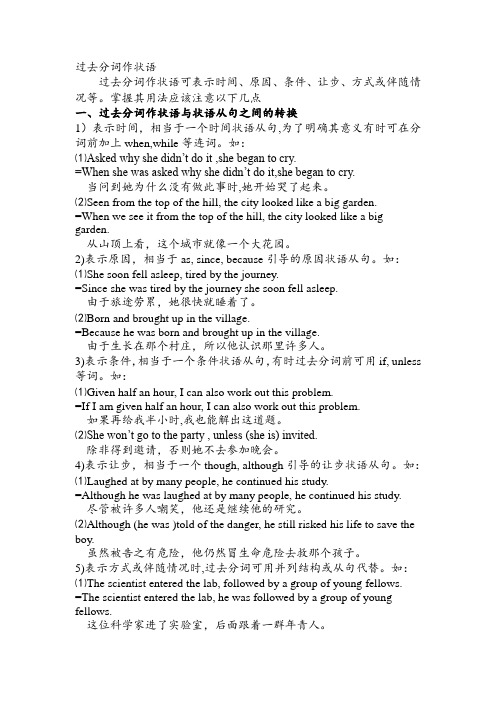
过去分词作状语过去分词作状语可表示时间、原因、条件、让步、方式或伴随情况等。
掌握其用法应该注意以下几点一、过去分词作状语与状语从句之间的转换1)表示时间,相当于一个时间状语从句,为了明确其意义有时可在分词前加上when,while等连词。
如:⑴Asked why she didn’t do it ,she began to cry.=When she was asked why she didn’t do it,she began to cry.当问到她为什么没有做此事时,她开始哭了起来。
⑵Seen from the top of the hill, the city looked like a big garden.=When we see it from the top of the hill, the city looked like a big garden.从山顶上看,这个城市就像一个大花园。
2)表示原因,相当于as, since, because引导的原因状语从句。
如:⑴She soon fell asleep, tired by the journey.=Since she was tired by the journey she soon fell asleep.由于旅途劳累,她很快就睡着了。
⑵Born and brought up in the village.=Because he was born and brought up in the village.由于生长在那个村庄,所以他认识那里许多人。
3)表示条件,相当于一个条件状语从句,有时过去分词前可用if, unless 等词。
如:⑴Given half an hour, I can also work out this problem.=If I am given half an hour, I can also work out this problem.如果再给我半小时,我也能解出这道题。
过去分词作状语

过去分词作状语过去分词和-ing分词作状语一样,也可以表示时间、原因、条件、让步、方式或伴随情况等。
①表时间,相当于一个时间状语从句,有时过去分词前可加连词when或while来强调时间概念。
如:Seen from the top of the hill, the city looked like a big garden. 从山顶上看,这个城市就像一个大花园。
Accepted by the Party, he decided to devote his life to the cause of the Party.入党以后,他决定献身于党的事业。
②表原因,相当于一个原因状语从句。
如:Deeply moved by the story, the excited people stopped quarrelling with each other.激动的人们被那个故事深深地感动了,停止了争吵。
Encouraged by the speech, the young people made up their minds to take up the struggle.受到了讲演的鼓舞,年轻人决定起来从事斗争。
③表条件,相当于一个条件状语从句,有时过去分词前可用if等词。
如:Given another chance, he will do better.再给他一次机会,他会做得更好。
Compared with your brother, you should make greater efforts to study English.和你哥哥相比,你应该更加努力学习英语。
If heated, water can be turned into steam. 水如果被加热,会变成水蒸气。
④表让步,相当于一个though/although引导的让步状语从句。
如:Exhausted by the running, they went on running after the robber.尽管已经跑得筋疲力尽,他们还是继续追赶着那个强盗。
过去分词作状语
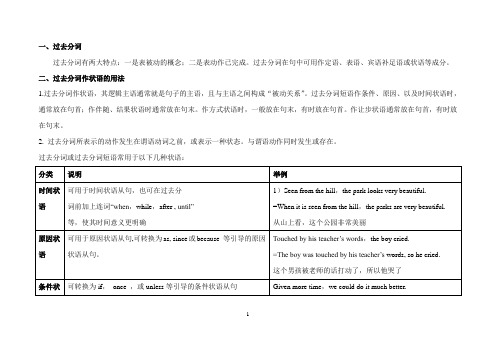
一、过去分词
过去分词有两大特点:一是表被动的概念;二是表动作已完成。
过去分词在句中可用作定语、表语、宾语补足语或状语等成分。
二、过去分词作状语的用法
1.过去分词作状语,其逻辑主语通常就是句子的主语,且与主语之间构成“被动关系”。
过去分词短语作条件、原因、以及时间状语时,通常放在句首;作伴随、结果状语时通常放在句末。
作方式状语时,一般放在句末,有时放在句首。
作让步状语通常放在句首,有时放在句末。
2. 过去分词所表示的动作发生在谓语动词之前,或表示一种状态。
与谓语动作同时发生或存在。
过去分词或过去分词短语常用于以下几种状语:
1
2。
过去分词作状语

9. The research is so designed that once _____ nothing can be done to change it. A. begins B. having begun C. beginning D. begun 析:正确答案为 D 项。分析语境逻辑可 该空含义为“ 这研究 一旦被开始” 这研究)一旦被开始 知,该空含义为“(这研究 一旦被开始”, 作状语。 因此应填过去分词 begun作状语。 作状语
When heated, ice can be changed into water.(时间) (时间) 冰加热时变成水。 冰加热时变成水。
注意: 注意: ①当从句的主语与主句的主语一致时, 当从句的主语与主句的主语一致时, 才可以把从句的主语省略, 才可以把从句的主语省略,且省略掉的 主语与其逻辑谓语是被动关系或如第一 段中所讲的表示状态。 段中所讲的表示状态。 ②把状语从句改为过去分词作状语时有 时还可保留连词,构成“连词+过去分词 过去分词” 时还可保留连词,构成“连词 过去分词” 结构作状语, 结构作状语,即“while (when, once, until, if, though等连词 过去分词”结构。 等连词)+过去分词 等连词 过去分词”结构。 如:
3. 当问到他出生在哪里时,约翰说他 当问到他出生在哪里时, 是纽约人。 是纽约人。 When asked where he was born, John said he was a New Yorker.
配套练习 1. ___ in thought, he almost ran into the car in front of him. A. Losing B. Having lost C. Lost D. To lose 动词-ing或过去分词作状语 其逻辑 或过去分词作状语, 动词 或过去分词作状语 主语应是主句主语。 主语应是主句主语。
过去分词短语作状语的用法

过去分词短语作状语的用法过去分词短语作状语的用法有很多,以下是60条以上的例子:1. 修饰动词:- 滑冰时,小明跌倒了。
- 他一边读书,一边写作业。
- 她唱完了歌,向观众鞠躬。
2. 修饰形容词:- 他很困疲,连续工作了十个小时。
- 她非常兴奋,因为她被录取了。
3. 修饰副词:- 他跑得很快,追上了那个小偷。
- 他讲得很认真,大家都很受感动。
4. 表示时间:- 昨天我在图书馆看书。
- 他在军队服役了两年。
5. 表示原因:- 天气太热了,我们决定去游泳。
- 因为过去常常下雨,他没有收获到很多庄稼。
6. 表示结果:- 摔跤后,他的腿受伤了。
- 长时间的用眼使她的视力变差了。
7. 表示条件:- 如果得了好成绩,他们就会给她一个奖学金。
- 假如你赢了比赛,我会带你去庆祝。
8. 表示让步:- 尽管难以置信,他们完成了任务。
- 即使生活各方面都很困难,他也从未放弃。
9. 表示方式:- 他小声地说,以免被听到。
- 警察把他粗暴地逮捕起来。
10. 表示伴随:- 我们一起坐在海滩上看着日落。
- 在音乐声中,他们舞蹈了一整晚。
11. 表示目的:- 他去邮局寄信。
- 我们买了一些食物,为了备不时之需。
12. 表示程度:- 晚餐做得很好,大家都吃得很饱。
- 雨下得很大,我们都淋湿了。
13. 表示顺序:- 他按照指示一步一步地进行。
- 他按照说明书安装了电视。
14. 表示比较:- 她比我学得更快。
- 这部电影比预期更好看。
15. 表示条件:- 假如你想要通过考试,你就需要努力学习。
- 如果下雨,我们就会取消野餐计划。
16. 表示结果:- 失去工作,他变得沮丧。
- 她的努力得到了回报。
17. 表示时间:- 经历了许多困难,他终于实现了梦想。
- 她看了一会电视,然后出去散步。
18. 表示原因:- 由于道路交通拥堵,我们迟到了。
- 风大得让树都被吹倒了。
19. 表示让步:- 尽管工作很忙,他还是找时间陪孩子。
- 即使受伤了,他仍然坚持比赛。
什么时候过去分词作状语
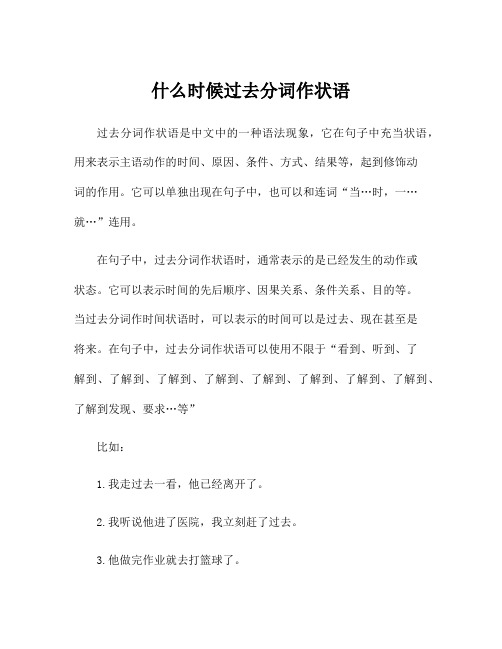
什么时候过去分词作状语
过去分词作状语是中文中的一种语法现象,它在句子中充当状语,用来表示主语动作的时间、原因、条件、方式、结果等,起到修饰动
词的作用。
它可以单独出现在句子中,也可以和连词“当…时,一…就…”连用。
在句子中,过去分词作状语时,通常表示的是已经发生的动作或
状态。
它可以表示时间的先后顺序、因果关系、条件关系、目的等。
当过去分词作时间状语时,可以表示的时间可以是过去、现在甚至是
将来。
在句子中,过去分词作状语可以使用不限于“看到、听到、了
解到、了解到、了解到、了解到、了解到、了解到、了解到、了解到、了解到发现、要求…等”
比如:
1.我走过去一看,他已经离开了。
2.我听说他进了医院,我立刻赶了过去。
3.他做完作业就去打篮球了。
4.太阳落山的时候,他还在工作。
过去分词作状语的句子有时候也可以通过改变主语的位置,将过
去分词置于主语之后,这样可以加强句子的逻辑关系,使句子更通顺。
这种句型通常通过“由于、因为、尽管、虽然、当…时,一…就…”
等连词连接。
比如:
1.由于工作繁忙,他常常加班到很晚。
2.因为生病了,他没能参加聚会。
3.虽然下雨了,但他照样去了操场。
总之,过去分词作状语是中文语法中的一种重要现象,它通过修
饰动词,增强了句子的信息量,使句子更加丰富和生动。
在写作中,
我们可以通过增加过去分词作状语的句式结构,使句子更加多样化,
达到丰富语言表达的目的。
过去分词作状语

过去分词作状语
过去分词作状语的情况分类如下:
1、过去分词做时间状语。
Asked about his family,he made no answer。
当问到有关他的家庭的情况时,他没有回答。
2、过去分词做条件状语。
United,we stand,divided,we fall。
团结,我们就能独立;分裂,我们必然倒下。
3、过去分词做方式或伴随状语。
The boy slipped out of the room,followed by his pet dog。
这个男孩溜出了房间,后面跟着他的宠物狗。
4、过去分词做让步状语。
Rejected many times,the man did not lose heart。
虽然被拒绝了很多次,这个人并没有失去信心。
5、过去分词作原因状语。
Seriously injured,he had to be taken to the hospital。
由于伤得很严重,只好把他送往医院。
过去分词作状语和短语动词
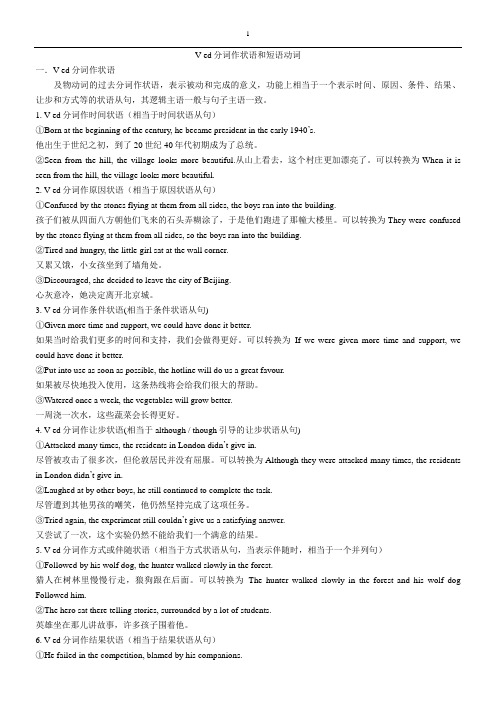
V-ed分词作状语和短语动词一.V-ed分词作状语及物动词的过去分词作状语,表示被动和完成的意义,功能上相当于一个表示时间、原因、条件、结果、让步和方式等的状语从句,其逻辑主语一般与句子主语一致。
1. V-ed分词作时间状语(相当于时间状语从句)①Born at the beginning of the century, he became president in the early 1940’s.他出生于世纪之初,到了20世纪40年代初期成为了总统。
②Seen from the hill, the village looks more beautiful.从山上看去,这个村庄更加漂亮了。
可以转换为When it is seen from the hill, the village looks more beautiful.2. V-ed分词作原因状语(相当于原因状语从句)①Confused by the stones flying at them from all sides, the boys ran into the building.孩子们被从四面八方朝他们飞来的石头弄糊涂了,于是他们跑进了那幢大楼里。
可以转换为They were confused by the stones flying at them from all sides, so the boys ran into the building.②Tired and hungry, the little girl sat at the wall corner.又累又饿,小女孩坐到了墙角处。
③Discouraged, she decided to leave the city of Beijing.心灰意冷,她决定离开北京城。
3. V-ed分词作条件状语(相当于条件状语从句)①Given more time and support, we could have done it better.如果当时给我们更多的时间和支持,我们会做得更好。
过去分词作状语课件

练习题五
总结词
综合运用过去分词作状语的能力
VS
详细描述
这道练习题要求学生综合运用过去分词作 状语的能力,通过写作和翻译练习,让学 生在实际运用中掌握过去分词作状语的用 法,提高语言表达能力。
THANKS
在某些情况下,如果需要强调动作或状态的完成或实现, 可以使用完成时态的过去分词形式,如“Having been done”。
注意与独立主格结构的区别
独立主格结构是指一个名词或代词作 为主语,与谓语动词不存在逻辑上的 主谓关系,而是通过非谓语动词的形 式表达动作或状态。
过去分词作状语时,其动作或状态与 句子主语存在逻辑上的主谓关系,因 此应与主句保持连贯和一致。
例如:“Speaking English, he could communicate with the native speakers.”(他说英语,能够与母语为英语的人交流。)“Having finished his work, he went home.”(完成工作后,他回家了。)
02
过去分词作状语的分类
过去分词作原因状语
1 2
原因状语的定义
用来表示某个动作或情况发生的原因或理由。
过去分词作原因状语的例子
Feeling tired, she decided to take a rest. (因 为感到累了,她决定休息一下。)
3
总结
过去分词作原因状语时,通常放在句首或句尾, 表示某个动作发生的原因或理由。
过去分词作让步状语
01
让步状语的定义
用来表示某个动作或情况发生的转折或让步。
02
过去分词作让步状语的例子
Although treated unfairly, he never complained. (尽管受到了不公
过去分词作状语

非谓语动词:过去分词过去分词短语作状语过去分词表示完成或被动,作状语时,表示动作发生的背景或者情况,在意义上相当于一个状语从句,其省略的主语逻辑主语是主句的主语,且与主语之间存在被动关系;过去分词作状语可以表示时间、条件、方式、原因、让步等;过去分词的否定式是将not放在其前面;一、过去分词作状语时的具体用法:1)过去分词作时间状语时,相当于一个时间状语从句;有时过去分词前可加连词when或while来强调时间概念.例:1. Asked When he was asked what had happened, his face turned red.当他被问及发生了什么的时候,他的脸红了;2. When heated When it is heated, water changes into steam. 当加热时,水变成水蒸气;3.Told that his mother was illWhen he was told that his mother was illl, Li Lei hurried homequickly. 李蕾得知母亲生病了时,马上赶回了家;4. Seen from the moonWhen it is seen from the moon , the earth looks green. 从月亮上看时,地球是绿色;2)过去分词作原因状语时,相当于一个由as, since, because等词引导的原因状语从句;例:1. Deeply Because they were moved by the movie, the children began to cry.由于被电影深深地感动,孩子们哭了起来;2. Frightened Because she was frightened by the horror movie, the girl didn't dare to sleepalone. 因为被惊悚电影吓坏了,这个女孩不敢单独睡觉;3. Caught in a heavy rain Because he was caught in a..., he was all wet.4. Satisfied with what he did Because the teacher was satisfied with..., the teacherpraised him in class. 由于老师对他所做的事情很满意,于是在班上表扬了他;3)过去分词作条件状语时,通常放在句子的前面,相当于if, unless等引导的条件状语从句; 例:1. Compared with you If we are compared , we still have a long way to go.和你们比起来,我们还有很长的一段路要走;2. Grown If these seeds are grown in rich soil, these seeds can grow fast.如果种在肥沃的土壤里,这些种子能长得很快;3. Given more time If we were given more time, we would be able to do the work muchbetter.4. Given a few minutes If I am given a few minutes, I’ll finish it. 再给几分钟的时间,我就会完成了4)过去分词作让步状语时,相当于一个以though / although引导的让步状语从句,这类分词或分词短语一般放在句子前面;例:1. Left Although he was left at home, John didn't feel afraid at all.虽然John被单独留在房间里, 他一点都不害怕;2. Invited by him Though I was invited by them , I won’t take part in the party.即使被邀请,我也不会参加聚会的;3. Explained a hundred times Although he was explained... , he still can’t understand it. 即使给他解释一百篇,她还是不会明白;4.Trained ten hours a day Though he was trained..., he will still be a fool. 即使每天训练十个小时,他也还会是个傻瓜;5)过去分词作状语表方式或伴随状语时不用状语从句替换,但可以改写成并列句;例:1.She walked out of the house, and she was followed by her little daughter.她走出房子,后面跟着她小女儿;2. She was Dressed in white, and she looked really pretty.穿着白衣服,她看起来确实很美;3.She sat by the window, and she was lost in thought.二、过去分词与现在分词作状语的区别:1)过去分词表完成、被动,与主句的主语之间是被动关系;现在分词表进行、主动,与主句的主语之间是主动关系;试比较:Following the old man, we went upstairs. 跟着那个老人, 我们上了楼;= We followed the old man, and we went upstairs.Followed by the old man, we went upstairs. 我们上了楼, 后面跟着那个老人;= We were followed by the old man, and we went upstairs.Seen from the top, the stadium looks like a bird nest. 从上面看,体育场好像一个鸟巢;Seeing from space, the astronaut can not discover the Great Wall. 从太空看,宇航员看不到长城;2)若分词主语与句中主语不一致,则可以用其他方法来修正;①用with的复合结构等.②改为相应的状语从句来表达;③给分词添加自己的主语,构成独立主格结构④改变语态;例如:完成作业后,孩子们出去踢足球了;Finished their homework, the children went out to play football. ×Their homework finished, the children went out to play football. 独立主格Having finished their homework, the children went out to play football.现在分词完成形式With their homework finished表时间, the children went out to play football. with的复合结构After finishing their homework, the children went out to play football. 介词+动名词例如:当他过马路时,一辆车撞到了他;误:Crossing the road, a car knocked him down.误:Crossed the road, he was knocked down by a car.正:Crossing the road, he was knocked down by a car. 过马路时他被车撞倒了;正:When he was crossing the road, a car knocked him down. 他过马路时车子把他撞倒了; ※注意:的由来解决状语分词的逻辑主语与句子主语不一致的问题,也可在分词前加一个名词或代词,使之成为分词的逻辑主语;由于加在分词前的名词或代词要用主格形式,例:He crossing the road, a car knocked him down.The job finished, we went home. 工作结束后我们就回家了;The weather being fine, we went swimming. 天气很好,我们就去游泳了;He being absent, nothing couldn’t be done. 由于他缺席,什么事也干不成;误:Barking madly,I led the dog out.正:The dog barking madly, I led it out.正:Barking madly,the dog was let out by me.正:Becuase the dog was barkling madly, I led it out.正:With the dog barking madly, I led it out.三、有些过去分词因源于系表结构,已经被形容词化;故作状语时不表被动而表主动,表示人的状态;get lost; be lost in沉溺于;be seated; be compared withbe dressed in; be born; be tired of 厌烦; be tired from be worried about表状态be interested in; be moved by; be disappointed at; be surprised at四、选择现在分词还是过去分词,关键看主句的主语;如分词的动作是主句的主语发出,分词就选用现在分词,反之就用过去分词;Used for a long time, the book looks old. Using the book, I find it useful.Looking at her, he jumped with joy. Looked at by her, he jumped with joy.五、正如第四点所说,不论是动词不定式作状语、-ing分词做状语,还是动词的过去分词作状语,其逻辑主语必须是句子的主语;但是,有一些非谓语动词短语已经游离出来,成为单独的短语,在句子中作状语;如:1 exactly / honestly / frankly / generally speaking, 准确地说不过去/ 老实地说/ 坦率地说/ 一般说来;例:1. Exactly speaking, he got here at eight fourteen this morning. 准确地说,今天早晨他是十八点十四分来到这里的;2. Generally speaking, a snake won’t attack a man unless it is bothered. 一般说来,蛇是不会攻击人的除非你冒犯了它;2 / by... 从/ 根据某东西判断例:1. Judging by his accent, he is from Hunan. 从他的口音来判断,他是湖南人;2. Judging from what he said, he is very honest. 从他所说的话来判断,它是很诚实的;3 providing / provided …假如/ 如果例:1. Providing he follows our advice, we can help him. 要是他按我们的建议去做,我们就能帮助他;2. Provided he is free, he is sure to come. 如果他有空,他肯定会来;4 considering... 考虑到例:1. Considering he was just a little boy, we didn’t punish him. 考虑到他还只是一个小孩,我们就没有惩罚他了;2. Considering it was late, we didn’t discuss the question. 考虑到时间不早了,我们就没有讨论这个问题了;5 ... 想到/ 考虑到例:Thinking of the environment we live in, the waste can’t be thrown away around directly. 考虑到我们所生存的环境,废物不能直接到处乱扔;6 talking of... 谈到/ 说到例:Talking of math, he became excited. 谈到数学,他就兴奋起来了;此外,还有短语:taking...into consideration 把某事考虑进去;calculating roughly, 粗略地计算;supposing... 假定;to tell you the truth 实话告诉你;to be frank 坦白地说;to begin with 首先要做的是;so to speak 可以这么说;taken as a whole 从整体上来看;put frankly, 坦率地说;鉴于等;Ilearn过去分词:作状语练习Multiple Choices Given a lever, anyone can move the earth with it.1.____ into English, the sentence was found to have an entirely different word order.A.TranslatingB. TranslatedC. To translateD. Having translated2.____ the right kind of training, these teenage soccer players may one day grow into international stars.A. GivingB. Having givenC. To giveD. Given3.____ an important role in a new movie, Andy has got a chance to become famous.A. OfferB. OfferingC. OfferedD. To offer4.____ twice, the postman refused to deliver our letters unless we chained our dog.A. Being bittenB. BittenC. Having bittenD. To be bitten5.____ from the top of the tower, the south foot of the mountain is a sea of trees.A. SeenB. SeeingC. Having seenD. To see6.____ time, he’ll make a first-class tennis player.A. Having givenB. To givenC. GivingD. Given7.The island, ____ to the mainland by a bridge, is easy to go to.A. joiningB. to joinC. joinedD. having joined8.____ from this point of view, the question will be of great importance.A. ConsideringB. ConsiderC. To considerD. Considered9.When ____ through the book, I came across an interesting picture.A. lookB. lookingC. lookedD. being looked10.____ that film, I am afraid I cannot say anything about it.A. Not having seenB. Having seenC. Having been seenD. Not seen。
- 1、下载文档前请自行甄别文档内容的完整性,平台不提供额外的编辑、内容补充、找答案等附加服务。
- 2、"仅部分预览"的文档,不可在线预览部分如存在完整性等问题,可反馈申请退款(可完整预览的文档不适用该条件!)。
- 3、如文档侵犯您的权益,请联系客服反馈,我们会尽快为您处理(人工客服工作时间:9:00-18:30)。
非谓语动词:过去分词过去分词(短语)作状语过去分词表示完成或被动,作状语时,表示动作发生的背景或者情况,在意义上相当于一个状语从句,其省略的主语(逻辑主语)是主句的主语,且与主语之间存在被动关系。
过去分词作状语可以表示时间、条件、方式、原因、让步等。
过去分词的否定式是将not放在其前面。
一、过去分词作状语时的具体用法:1)过去分词作时间状语时,相当于一个时间状语从句。
有时过去分词前可加连词when或while来强调时间概念.例:1. Asked (When he was asked) what had happened, his face turned red.当他被问及发生了什么的时候,他的脸红了。
2. When heated (When it is heated), water changes into steam. 当加热时,水变成水蒸气。
3.Told that his mother was ill(When he was told that his mother was illl), Li Lei hurriedhome quickly. 李蕾得知母亲生病了时,马上赶回了家。
4. Seen from the moon(When it is seen from the moon) , the earth looks green. 从月亮上看时,地球是绿色。
2)过去分词作原因状语时,相当于一个由as, since, because等词引导的原因状语从句。
例:1. Deeply (Because they were) moved by the movie, the children began to cry.由于被电影深深地感动,孩子们哭了起来。
2. Frightened (Because she was frightened) by the horror movie, the girl didn't dare to sleepalone. 因为被惊悚电影吓坏了,这个女孩不敢单独睡觉。
3. Caught in a heavy rain (Because he was caught in a...), he was all wet.4. Satisfied with what he did (Because the teacher was satisfied with...), the teacherpraised him in class. 由于老师对他所做的事情很满意,于是在班上表扬了他。
3)过去分词作条件状语时,通常放在句子的前面,相当于if, unless等引导的条件状语从句。
例:1. Compared with you (If we are compared) , we still have a long way to go.和你们比起来,我们还有很长的一段路要走。
2. Grown (If these seeds are grown) in rich soil, these seeds can grow fast.如果种在肥沃的土壤里,这些种子能长得很快。
3. Given more time (If we were given more time), we would be able to do the work muchbetter.4. Given a few minutes (If I am given a few minutes), I’ll finish it. 再给几分钟的时间,我就会完成了4)过去分词作让步状语时,相当于一个以though / although引导的让步状语从句,这类分词或分词短语一般放在句子前面。
例:1. Left (Although he was left) at home, John didn't feel afraid at all.虽然John被单独留在房间里, 他一点都不害怕。
2. Invited by him (Though I was invited by them) , I won’t take part in the party.即使被邀请,我也不会参加聚会的。
即3. Explained a hundred times (Although he was explained...) , he still can’t understand it.使给他解释一百篇,她还是不会明白。
4.Trained ten hours a day (Though he was trained...), he will still be a fool. 即使每天训练十个小时,他也还会是个傻瓜。
5)过去分词作状语表方式或伴随状语时不用状语从句替换,但可以改写成并列句。
例:1.She walked out of the house, (and she was) followed by her little daughter.她走出房子,后面跟着她小女儿。
2. (She was) Dressed in white, (and) she looked really pretty.穿着白衣服,她看起来确实很美。
3.She sat by the window, (and she was ) lost in thought.二、过去分词与现在分词作状语的区别:1)过去分词表完成、被动,与主句的主语之间是被动关系;现在分词表进行、主动,与主句的主语之间是主动关系。
试比较:Following the old man, we went upstairs. 跟着那个老人, 我们上了楼。
= We followed the old man, and we went upstairs.Followed by the old man, we went upstairs. 我们上了楼, 后面跟着那个老人。
= We were followed by the old man, and we went upstairs.Seen from the top, the stadium looks like a bird nest. 从上面看,体育场好像一个鸟巢。
Seeing from space, the astronaut can not discover the Great Wall. 从太空看,宇航员看不到长城。
2)若分词主语与句中主语不一致,则可以用其他方法来修正。
①用with的复合结构等.②改为相应的状语从句来表达。
③给分词添加自己的主语,构成独立主格结构④改变语态。
例如:完成作业后,孩子们出去踢足球了。
Finished their homework, the children went out to play football. (×)Their homework finished, the children went out to play football. (独立主格)Having finished their homework, the children went out to play football.(现在分词完成形式)With their homework finished(表时间), the children went out to play football. (with的复合结构) After finishing their homework, the children went out to play football. (介词+动名词)例如:当他过马路时,一辆车撞到了他。
误:Crossing the road, a car knocked him down.误:Crossed the road, he was knocked down by a car.正:Crossing the road, he was knocked down by a car. 过马路时他被车撞倒了。
正:When he was crossing the road, a car knocked him down. 他过马路时车子把他撞倒了。
※注意:分词的独立主格结构的由来解决状语分词的逻辑主语与句子主语不一致的问题,也可在分词前加一个名词或代词,使之成为分词的逻辑主语。
由于加在分词前的名词或代词要用主格形式,例:He crossing the road, a car knocked him down.The job finished, we went home. 工作结束后我们就回家了。
The weather being fine, we went swimming. 天气很好,我们就去游泳了。
由于他缺席,什么事也干不成。
He being absent, nothing couldn’t be done.误:Barking madly,I led the dog out.正:The dog barking madly, I led it out.正:Barking madly,the dog was let out by me.正:Becuase the dog was barkling madly, I led it out.正:With the dog barking madly, I led it out.三、有些过去分词因源于系表结构,已经被形容词化。
故作状语时不表被动而表主动,表示人的状态。
get lost; be lost in(沉溺于);be seated; be compared withbe dressed in; be born; be tired of (厌烦); be tired from be worried about(表状态)be interested in; be moved by; be disappointed at; be surprised at四、选择现在分词还是过去分词,关键看主句的主语。
如分词的动作是主句的主语发出,分词就选用现在分词,反之就用过去分词。
Used for a long time, the book looks old. Using the book, I find it useful.Looking at her, he jumped with joy. Looked at by her, he jumped with joy.五、正如第四点所说,不论是动词不定式作状语、-ing分词做状语,还是动词的过去分词作状语,其逻辑主语必须是句子的主语。
